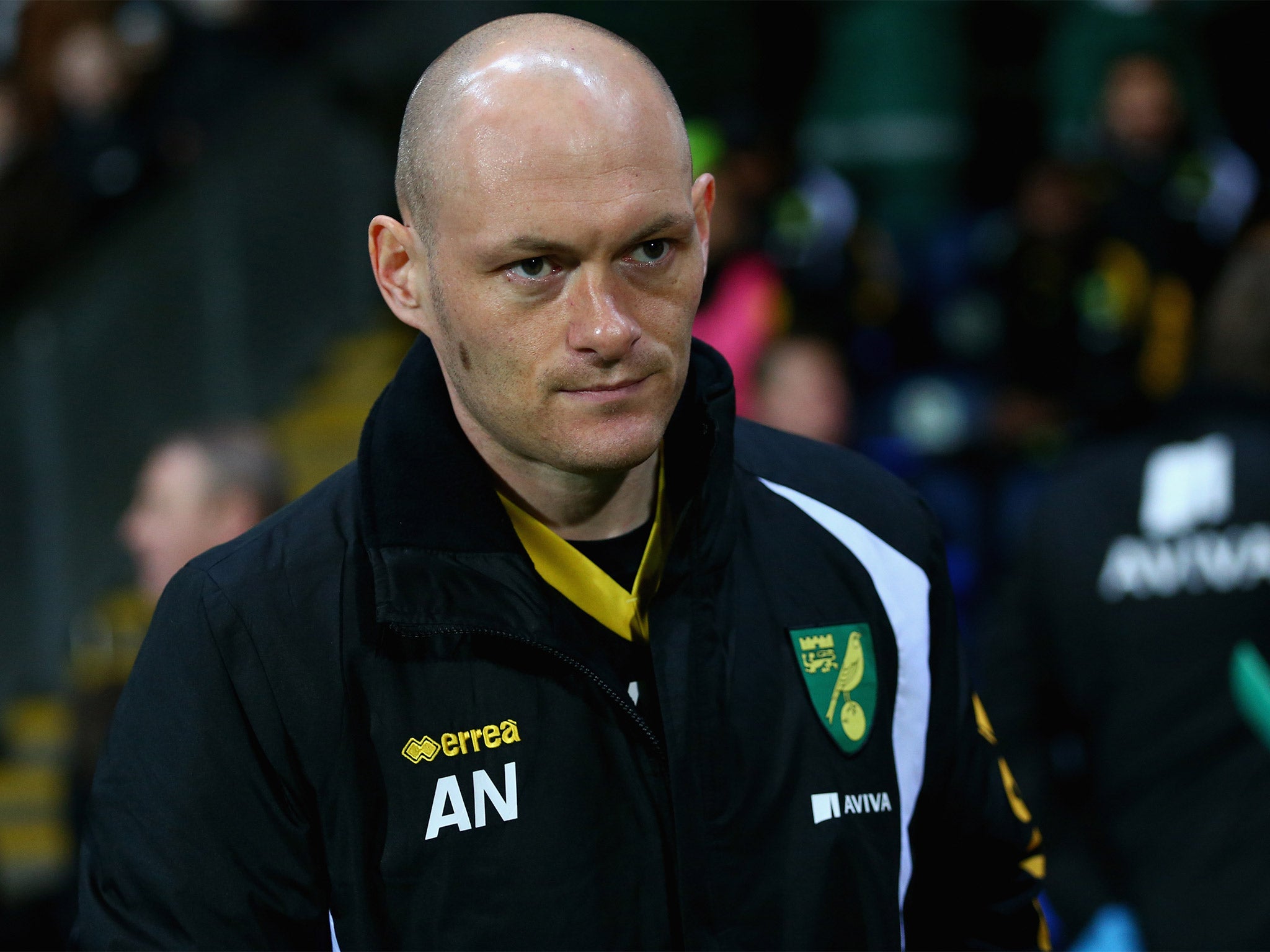He is only 33 but Norwich City's Alex Neil is a manager who knows what he wants and how to get it
Life Beyond the Premier League: His confidence befits a man who has known only success in a managerial career that is less than two years old

As a student on the Scottish Football Association’s Pro-licence course, Alex Neil heard Gordon Strachan, the Scotland manager, describe the downside of his job last week, recalling “long nights where you think you are useless” and countless calls to his old sounding board, Howard Wilkinson.
When it comes to Neil himself, though, it is hard to detect any self-doubt in the Norwich City manager – only signs of an impressive inner steel. “I don’t speak to anybody for advice,” the 33-year-old tells The Independent at the club’s Colney training ground. “If I am looking for somebody else to tell me how I should do it, then really I am going on how they would do it rather than how I would, so I am my own man.”
This confidence befits a man who has known only success in a managerial career less than two years old: last May he led Hamilton Academical into the Scottish Premier League via a play-off against Hibernian and now he is chasing a second promotion with Norwich, the team he took over in January. Then, the Canaries sat 11 points off the Championship summit. Now, ahead of tomorrow’s trip to Brighton, they are three points behind leaders Bournemouth in fourth place, having won 10 and lost two of his 15 games in charge.
“It is more testing here than when I was at Hamilton,” he reflects, noting the bigger expectations at Carrow Road and recalling his initial surprise at the local reaction to results. “If we lost it was terrible and the end of the world,” he says, which was quite a contrast with Hamilton where “the fact we were a small fish made it easier for me to say to players, ‘Listen, let’s go and have a go’. It is probably roles reversed slightly down here – people look at us and are expecting us to do well.”
What has helped Neil hit the ground running as a manager in England – where he had five years as a player at Barnsley and Mansfield – is his experience of leading men. “I was a captain from when I was 23 and if somebody wasn’t pulling their weight I was quite happy to say what I needed to say.”
For the country’s second-youngest manager, the “real catalyst” in his development, he continues, was the decision by Billy Reid, the man he replaced as Hamilton manager in May 2013, to charge him with mentoring then teenagers James McCarthy and James McArthur – now at Everton and Crystal Palace respectively – in the Accies midfield.
“Billy gave me the captaincy and brought the two of them in. We played a middle three so I sat behind them and it was a case of trying to teach them the game and help bring them on as players. That was my task. Those two had enough legs for me. It was never my strongest point, I wasn’t the most mobile but I could read the game and pass the ball.”
He then began coaching Hamilton’s Under-17s during a long period sidelined by two hip operations. “Billy said to me, ‘Do a bit of coaching’ and it just snowballed. Billy had been there for seven years and then I took over [as manager] so the continuity was there.” Eventually, not long after Hamilton’s historic first win at Celtic Park since 1938, Norwich came calling. “There were a few things from Championship teams in England [who] had been sniffing about but the fact Norwich had the bravery to come and offer me the job – despite the fact I was so young – for me, that was really good.”
He has stopped playing since coming south – “I quickly realised they need a manager, they don’t need another player” – but wants Norwich to show the tenacity that characterised his own game, demanding “high pressure on teams in terms of getting after them and not giving them time and space on the ball”. And when they have it, he wants “a bit of invention and creativity, [with players] coming in off the line and joining in the play rather than [as] a lot of English-based teams are – get it wide, put it in the box.”
He also demands honesty from his players. “Honesty is realising the difference between when you’re doing well and when you’re not doing well and for some people that can be clouded – they seem to think if they haven’t done well it’s not their fault, it is someone else’s fault,” he says, adding: “Sometimes people don’t like hearing the truth but they have responded well to it and their performances have shown they are enjoying it and buying into it.”
This leads to a more general point about plain-speaking in football dressing rooms today. “It becomes rarer these days; people now in general want to be liked. You’ve got social networking sites and everyone wants to speak to each other. Nowadays people try and avoid saying how they see it, if it might upset somebody else. That is probably what makes me slightly different.”
Subscribe to Independent Premium to bookmark this article
Want to bookmark your favourite articles and stories to read or reference later? Start your Independent Premium subscription today.

Join our commenting forum
Join thought-provoking conversations, follow other Independent readers and see their replies